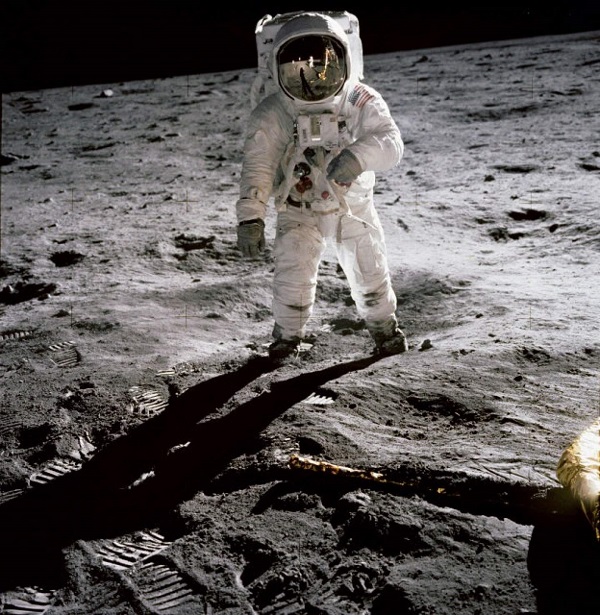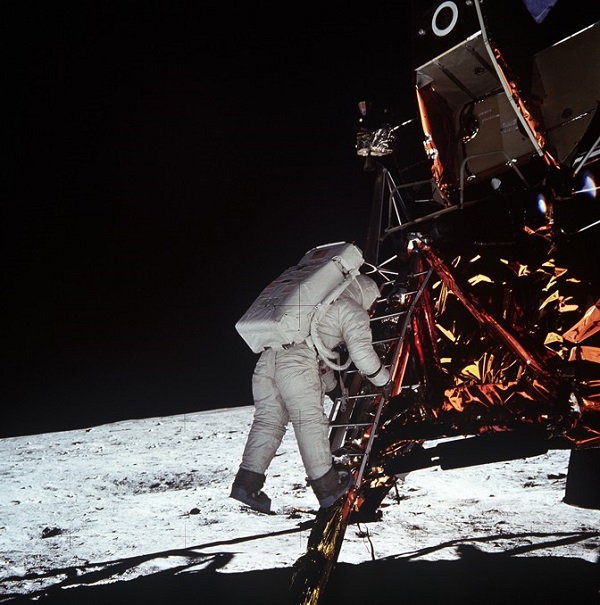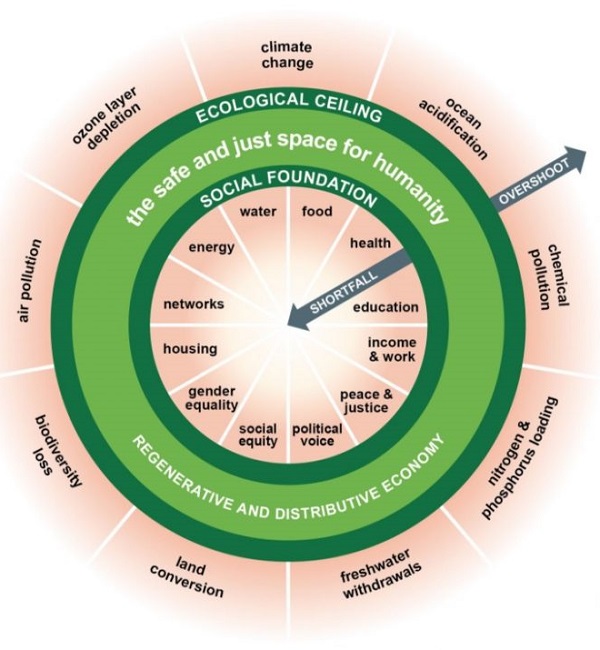1. Fly me to the moon
It’s one small step for man. One giant leap for mankind.
That was Buzz Aldrin [see correction as update below*], and here is the photo taken by Neil Armstrong:

Back then in 1969 I had just taken up work for the Education Department. The bloke who occupied the office next door had been seconded to head office to promote the use of television and other audiovisual gizmos in schools. He had a TV in his office, and grabbed me as I was on my way out. It’s one of life’s events that you remember where you were.
Not sure how Armstrong took this shot:

- From 1969 to 1972, Apollo carried a dozen astronauts on six missions to the surface of the moon, part of a program that cost from $112 billion to $146 billion (in 2019 dollars), and returned some 842 pounds of moon rocks to Earth.
That’s from Buzzfeed, who ask why we stopped going there and have not been back.
In simple terms, the US had beaten the Russians, it was a dead end, and the earth space program was more important.
Obama effectively vacated the field.
Phillip Adams talks to a collection of experts about the new space race in The Moon: geopolitics, commerce and militarisation. Multi-billionaires and the Chinese are joining the jostle. It’s everything from tourism, to a base station to Mars or mining the asteroid belt.
Apparently the moon has masses of helium 3, necessary for the dream of nuclear fusion and rare on earth.
Factoid: I heard that the moon is drifting away from us at the rate of 38mm each year.
Also I understand the Apollo mission used less computing power that you would find now in a calculator.
Aunty has a neat tour of the moon.
*Update: As zoot (see comment below) says, Neil Armstrong was first onto the moon surface and said “It’s one small step for man. One giant leap for mankind.” Gizmodo has the story, which sounds authentic. Armstrong was the more senior and captain of the mission, Aldrin was the pilot. NASA decided before they left who would have the honour. Here is the first footprint:

So it is said, and for good measure, the earth from the moon:

2. Serotonin vs dopamine
Pauline Sheldon Professor Emerita University of Hawaii was talking about sustainable tourism, but it got way more interesting than that.
This will be very familiar. She says our economy is based on assumptions:
- Self interest drives human behaviour. The sum of self interest creates demand in the economy. We are said to always act in perfect self interest.
- More income means more happiness.
- Economic progress only comes from competition. Co-operation and collaboration are counter-productive.
- Markets are fair and tell the truth.
- Consumption is encouraged for its own sake.
- We are addicted to growth GDP as a measure of growth. We should use more widely other indicators of well-being.
You may find that a bit simplistic, but you get the idea. She also referred to Kate Raworth’s concept of Doughnut economics. See:
Here’s the concept in an image:

First we need a foundation that provides everyone with a dignified life and the opportunities for personal growth.
Then aspiration and growth are fine, as long as ecological limits are not breached.
The really interesting bit, however, was when she told of new kinds of tourism experiences being offered, for example, in Amsterdam. Tourist were offered a chance to engage in acts of generosity to alleviate disadvantage in the local area.
Then comes the brain chemistry. If we engage in acts to pursue pleasure directly, dopamine is released, which gives a short term high, but a longer term downer.
If our focus is to help others, we get a burst of serotonin, which gives longer term satisfaction.
That may be simplistic too, but they’ve been doing it long enough to show it works. Tourists like it and come back for more, and to see how the people they’ve helped are getting along.
3. No surplus sacrifice for dole boost

The Coalition are very clear that people should not be too comfortable while on the dole. Here’s Michaelia Cash:
- “We are a nation defined by our workers and our aspiration, not our welfare system and apathy.
“We will never shirk our responsibility to be the architects of opportunity.”
The Greens will move a motion in the Senate this week calling for a $75 increase. This would cost the budget $3.6 billion per annum, about half the forecast surplus.
Here’s Philip Coorey’s summary of positions:
-
On Newstart, Labor has not nominated a dollar increase, just that it should be boosted following a review.
The Greens and the welfare lobby are among those calling for $75 a week.
Others demanding an increase to Newstart, which had its last above-inflation boost in 1994, include the Business Council of Australia, KPMG, the ACTU, Coalition backbencher Barnaby Joyce and National Seniors Australia.
The seniors group has become engaged as a consequence of growing unemployment among older people of working age, some of whom, especially women, are destitute. There are 173,196 people aged over 55 on Newstart.
The government is ideologically opposed to a real increase in Newstart and it argues that most recipients of the payment – currently $277 a week – are on other welfare payments as well.
It argues Newstart is designed to help find work and is not meant to be a living allowance, like the aged pension.
And it is also guarding its promise to return the budget to surplus in 2019-20. On Friday, Ministers Matt Canavan and Mathias Cormann both cited the surplus as a priority.
Shadow employment minister Brendan O’Connor dismissed her claims.
- “Senator Cash once again shows an inability to stand in the shoes of those that are struggling to keep their head above water,” he said.
“With business and union peak bodies, along with the welfare sector, unified in their support for a review of Newstart this government shows a callous disregard for our most vulnerable. “
That’s politics. I wonder how many are taking any notice and what difference it all makes.
4. Julian Assange
Tonight’s Four Corners is Hero or Villain: The prosecution of Julian Assange.
I heard program maker Michael Brissenden talk at some length on local radio. Seems Assange may be both and more, including reckless narcissist.
However, the bottom line is the possible frightening reach of American ‘justice’ which could reach out and lasso anyone, then lock them up for a century or more, mostly in solitary confinement.


Wasn’t it Armstrong who made the statement “One small step …”? And as he was first on the moon he was able to photograph Aldrin descending from the lunar module.
Cheers – your friendly neighbourhood pedant.
Thanks muchly zoot. I’ve inserted a correction:
As zoot (see comment below) says, Neil Armstrong was first onto the moon surface and said “It’s one small step for man. One giant leap for mankind.” Gizmodo has the story, which sounds authentic. Armstrong was the more senior and captain of the mission, Aldrin was the pilot. NASA decided before they left who would have the honour. Here is the first footprint:
So it is said, and for good measure, the earth from the moon:
“ Doughnut Economics “, haha, I see nothing economic about it.
It a wish list in diagram form with subjective parameters.
But let’s look at her assumptions about the present mixed economy and human proclivities.
Close enough, although it’s as perfect as people are.
Which is to say all folk are different and self interest is difficult to quantify. Many short term self interests can be detrimental long term and vice versa.
Also, supply is the main driver of an economy not demand.
( she’s obviously one of these Keynesian types )
Well that’s just not true. Plenty of well off folk are miserable.
First sentence correct if it’s free open market.
Second sentence is garbage. Of course there’s cooperation and collaboration. Unless there’s a product that’s mined, processed, fabricated, packed, sold and delivered by one person.
Nonsense, people are sometimes not fair or truthful.
That’s why competitive alternatives should exist and barriers to entry removed ( see big tech social media for examples of blatant anticompetitive, unfair, untruthful practices )
Encouraged yes, forced no ( that’d be socialist)
Well, I thing folk here know my perspective on GDP as a measure so no more to add there.
In summary I think this Professor has an incorrect caricature of the Classic Economics in her head that she’s mistaken for the reality that exists driven by some sort of unobtainable Marxist utopian fetish.
But I could be slightly off…. 🙂
An exemplary demonstration of the Dunning Kruger effect.
Thanks for your analysis, Jumpy. Reading it through allowed me to pick up a typo I had missed.
Can’t see why consumption would be forced under socialism, if it had ever been implemented as originally envisaged.
On Raworth’s “subjectivity” , You’ve no doubt heard of the Harvestor Case of 1907.:
Wise man, Judge Higgins.
Looking at the donut diagram and thinking about the worlds current population I would say that the social justice boundary would be well outside the ecologically safe boundary unless we do radical things to cut back the human footprint or seriously cut down what we think is needed inside the social justice boundary.
Part of the problem with corporate capitalism in a world that is hurtling towards an ecological ceiling is that corporate capitalism is all about “adding to shareholder value”. As a consequence CEO’s are under pressure to do things that add to shareholder value.
In some cases adding to shareholder value may actually reduce ecological footprint. (Think replacing a competitors product with a lower footprint product or growing the recycling arm.) But in other cases adding shareholder value might mean using advertising to convince people that they really do need the new product or to replace an old product before it has worn out. Or need a bigger mansion or have their plastering redone or…….
Adding shareholder value can also mean seeking easy growth by encouraging governments to increase immigration or setting housing standards that prohibit small houses or…..
Some of the things inside the social justice boundary will push this boundary closer to the ecologically safe boundary.
It is worth asking what would happen if some of these things were scaled back. For example, it is worth asking whether your life would be better if you worked less and had a lower income. (And what difference it would make to your answer if you knew you could get another job when you wanted it.)
If the Quarterly Essay blurb for Erik Jensen’s piece accurately reflects his approach, I must cavil at the crude binary opposition of “hope” and “fear” in describing the recent Aussie election campaigns….
as if all the fear mongering was on one side and all the appeals to hope were on the other…
every campaign mixes both; if the non LibNats believe they were ambushed and defeated solely by dark forces wielding fear, then look forward to several more election losses. …
It was never as simple as that.
And not in 2019.
Gough W campaigned on hope, optimism, concrete plans, in 1972 and won by a small margin of seats (not a landslide).
You just never can tell…..
Ambi, I haven’t read Jensen’s essay, nor will I, but I think he said the other night the Morrison was heavy on both hope and fear. Basically what he had to fly with was his tax cuts and the fear that Bill would get his hand in your pocket and take all of your money, completely skating over the fact that Bill was offering better tax cuts to 10 million Australians.
Jumpy, as no one else seems to have set you straight on this, you are more than “slightly off”. Kate Raworth was not asserting the things you quote – she was saying that those are the (mistaken) assumptions of mainstream economics.
That’s fine JD but the corporate world looks largely towards growth and best return on capital, justifying that by talking in terms of shareholder benefits.
Little is said about the greater responsibility to Earth. Sadly, the reliance upon the capitalist system is perfectly in step with the “Tragedy of the Commons” scenario, and relies on government or market intervention for guidance. Many aspects of the capitalist model also contribute to the alarming financial inequity in our world now. That includes the very powerful forces that seem bent on preserving and expanding the share held by very few. I don’t know what it will take to start some equity to society, but sooner or later it will have to change.
Or rather, Pauline Sheldon was! I got a but confused there myself, but either way it was a critique, not an endorsement, of those statements.
And now Boris is set to become the PM of the UK. Britain will get its own Trump. Theresa May will visit the Queen to resign allowing Boris to be sworn as PM.
Corbyn may go for a no confidence vote that could collapse the government. Or I don’t know if May has the power to simply dissolve parliament triggering an election.
Interesting times.
The main thing that interested me was the changes in tourism she outlined, which seem to be successful. She thinks the current style of tourism is unsustainable.
Thanks Val.
Cheerio
A
(There’s a little story in the New Testament about “motes” and “logs”……)
Two comments from Geoff H have just been liberated, starting with this one.
Geoff, it’s a simple typo in your surname, I presume!
Thanks Brian… no real excuse 🙂
No probs, Geoff. I nearly signed myself off as my sister today!
In the AFR Newstart pressure builds as Nationals back rise.
Apparently a majority of the Nats are now pushing for a rise, now being joined by a couple of Libs.
Yesterday I heard two of the Greens make speeches about this one. It’s the fifth time they’ve proposed it. When the rise comes, as it will, they will own it.
Morrison and co are looking increasingly mean. Michaelia Cash accused the opposition of advocating welfare over aspiration.
Labor has a complicated story to tell. They have been consistent, and consistently in favour of an above inflation rise, but in the end will look as though they were playing politics.
GH:
Hadn’t thought of the tragedy of the commons link to capitalism but so many capitalist organizations are using the common as a core resource.
Having said that socialism has to keep the masses happy so it becomes nothing much more than socialized capitalism.
John, you are aware that a Capitalist Corporation involves 3 entities right ?
1) There are shareholders ( or owners) that can freely boycott any company they deem as harmful to the environment and invest as their conscience directs.
2) There are consumers of the product that company produces. They are free to boycott those products if they deem them harmful to the environment and purchase as their conscience directs.
3) There are managers that direct the company to best serve both 1 and 2.
Demonising or trying to force the managers is futile if the owners and customers disagree with you.
Seems to me you may need to change 2 to affect change, then 1 and 3 will follow.
Therein lies the failure of the greens.
Hi Jumpy
Have you analysed The Tragedy of the Commons?
Or do you believe that there is no such thing as the Commons?
Hasta la vista.
Mr A
Not in any deep way, no.
Not at all but there are levels of commons from family though State to Global ( and perhaps beyond ? )
With Capital Corporations there are 3 entities consciences that need to be satisfied.
But I do take your point about Adani where the Shareholders, managers and Consumers can be troublesome if they happen to prefer getting out of poverty rather than reducing CO2.
So perhaps convincing them would actually be a more fruitful exercise environmentally.
( it’s strange to me that “ demand side “ Keynesian types are preferring to try and fix the supply side rather than the demand side to fix global warming. So contradictory. [ not directed at you personally ] )
From me,
That was worded terribly.
Obviously the owners and managers are not in poverty.
My intention was to focus on the consumers but I mucked it up.
Jumpy: Do you really run Jumpy Enterprises to the environmental, ethical etc. standards you seem to think is OK for the rest of the capitalist world?
Or does the chief shareholder insist on the high standards she thinks are required to maintain JE,s reputation?
Capitalism does have its down side.
Zoot that is a frightening example of corporate manipulation over the good of the people.
Now if we are able to see that Pharma is just an example of what has hoodwinked the world, we could add oil, coal, steel and many other huge components of capitalism.
I’m OK with capitalism until it coalesces into market-controlling conglomerates that hold policy as captive and manipulate the market and thus the people.
Never thought, growing up, that I would see this.
The danger was recognised in the US, and “anti-trust laws” devised to restrict the largest thefts.
What happened?
Were the Congresspersons in those far off days more independent and clear thinking than nowadays?
Ambi I don’t know the specifics but I’ve thought for sometime that the flow of money to politicians and the army of lobbyists in the US has an undue influence upon greater America. Probably an understatement. My suspicion is that influence began way back with the synergistic growth of rail, steel, newspapers, big money and others that developed a cadre of highly influential people and corporations. That influential sector is still IMHO, still in play in the US albeit the players have changed a little bit. Same thing in Oz but less obvious.
Last night I almost finished a post, but came up short. Today I have to write some stuff for Labor’s review of the election. Much already published here, but might get a new post of two out of it next week.
I told Geoff Meill multiple time I didn’t have time to be active in the party and blog here. That’s proving true.
Also I work about 20 hours a week and live in a family. Plus at my age you have to spend more time keeping yourself fit so that you can keep on spending time to keep yourself fit.
Brian I trust you have compelling evidence …
GH: The real decision makers are often a long way down the pecking order. For example, it was usually the ordinary GP who was deciding to use opiods and which brand to prescribe. Most doctors ethical alarm bell would go off if someone offered them serious money to support a particular product and the offer would be seen as an insult.
On the other hand, an invitation to a training course or mini conference with a bit of socializing afterwards would probably be seen as acceptable and not an over the top attempt to influence the doctors decisions. Effective sale people I have seen in operation get the balance right. They don’t complain if you ring over the weekend if you have an urgent problem, don’t push you over your ethical boundaries and give the general impression they they and their employer know what they are doing.
Zoot’s article kept on going back to Dr training courses. I think he had a point. How do you fix the training course problem?
JD you are very right about the distance between decision makers at one level and perhaps the “applied” decision makers at another level. Say, Big Pharma and GPs where Pharma generates a relationship with government (via contributions and maybe assist with Policy) that helps lubricate passage through FDA oversight. At the same time they are offering incentives to practitioners such as conferences that are located in exotic places, offer lots of side benefits and are tax deductible. OK it still has to make it past the doctors’ ethics but overall I would expect that Pharma is way in front. And I think the training course issue raised by yourself and Zoot (I think I had that in mind as a “conference”) is hard to police. If a medical graduate comes away with a debt of say $USD650,000 (varies a lot) then the now practising doctor needs to earn a lot of money. Makes a person very vulnerable to incentives.
I think though that the Big Brother is strong and powerful in the US and it is really the group in charge, and sit above the elected ones. Think Murdoch for an example.
Peoples individual preferences make Big Pharma, peoples individual preferences make Big Fossil Fuel, peoples individual preferences make Big Social Media…
The list goes on for what is made Big by Individual value decisions.
Government mandate won’t change human nature and their concept of value, better alternatives will.
Supply side folks, it’s that simple.
You either didn’t read the article or you have chosen to not understand it. No point in discussing the matter with you any further.
Jumpy it really is not simple. If you saw the Matrix you might know that within the whole series, people were controlled by some kind of AI machine – but did not realise it.
It’s quite analogous to what we now see with a relatively small population of “elites” directing society to perpetuate their control.
It can be hard to accept, but try, because your family will be increasingly captive.
BTW Jumpy, thousands of people travel to Mexico to buy their prescription drugs. Because they are more affordable or they go without. American health costs are so high it blisters your mind. For example, USD65,000 for a night in intensive care. ‘Got that from the bill my father in law got slugged with.
You mentioned choice?
I humbly suggest that Jumpy invest some time in clarifying what he means by Supply-Side Economics which is better known to some as the “trickle-down” policy espoused by 40th U.S. President Ronald Reagan.
I make this suggestion because our worthy contributor has written
GH
And miraculously you can see this but the majority of folk are just too stupid…
It takes a particular type of arrogance to think that way Mate.
Perhaps you’re blue pilled.
Zoot said in regard to my views on Capitalism,
I wish she’d listen to herself.
Ok, let’s do a real time little self examination test to see if we live up to our virtuous ideal of ourselves.
What are you wearing right now to protect you from that cruel bitch Mother Nature ?
Is it Big Petrochemical ( climate killer ) , Big Monoculture ( environment killer ) or Big Animal Cruelty?
That’s about as close to the bone after whatever Big Pharma you may be taking.
Here a hint, STOP IT.
It’sOK Jumpy, it took me many years to work it out, and a dash of humility too.
Jumpy:
However, most of my medical expenditure decisions are directly or indirectly decided by my doctor or are strongly influenced by advertising, media articles or other stuff I have read. Big Pharma can and does spend big money and big time trying to influence the people and organizations that influence my decisions and shutting down academics who produce inconvenient articles about their product.
What does your business do to connect with and influence the decisions of potential customers?
Jumpy:
Well said. Unlike perfect me, perhaps the same words could be applied to Lord Jumpy and the stuff he says as well? (Check with the chief shareholder to see if I have got it right.)
Wrong again.
I was writing about Jumpy’s expressed view on “Big Pharma”. In the comment he quoted, “the matter” I referred to was the article I had linked to previously.
Still waiting to hear why Jumpy is so enamored of Reagonomics when he thinks it is Marxist (and Keynesian).
It’s Classical Economics, not some made up term to be intentionally misleading.
“ trickledown “ I presume refers to sending money to the top to flow through the economy.
Look no further than Governments as the tippy top entities in our Nation.
Go look up the total turnover of the ASX 300 compared to Government turnover if you doubt what I say.
You zoot advocate “ trickledown “ through higher tax and spend.
Advocate for Venezuelanomics like your socialist heroes did 10 years ago if you like, but we all now see where that goes.
Thank you Professor Jumpy.
When are you collecting your Nobel Prize?
Nobel Prize?
Give it to Obama, he’ll take it undeservedly again.
But seriously, you must admit Government is the biggest corporation around right ?
( and yes I understand shareholdership is by birthright, revenue is gathered by force, expenditure is wasteful and career managers ( unelected bureaucrats) are essentially unsackable for life. )
Do you think Venezuelanomics is still an economic miracle like Corbyn, the greens and Sanders ?
Jumpy, get back to me when you can link to the section of “Wealth of Nations” which says
And while I’m here, let’s examine your idiosyncratic use of the terms left and right.
In this thread you emphasise that the Nazis were the National Socialist party, which most competent English speakers would interpret as you saying the Nazis were on the left politically.
Am I right so far?
Those fine young men (mainly) who marched with their tiki torches in Charlottesville chanting “Jews will not replace us” and making “Heil Hitler” salutes are generally considered to be neo-nazis. I can only conclude they must also be on the left in your world view. (Or have I missed something?)
Yet the undeniably leftist Antifa are implacably opposed to them. How can this be?
Are we witnessing the disintegration of the left?
Contributor Jumpy, I think you’ll find some bureaucrats get sacked.
Others are made redundant when a budget cutting exercise is undertaken. Others refuse to move to Armadale at the behest of the Minister. Others move to a job in private industry.
It was said years ago that Universities were “sheltered workshops” where “tenure” meant a sinecure for life. These days, not so much. Pressure to publish; closing down of Departments whose student enrolments (and/or overseas student fees) fall…..
See also Ridd, Peter.
And employment in TAFE seems precarious at times too.
Do you get good apprentices?
The whole shebang is more varied than any of us can imagine.
Meanwhile,
$ pharmaceutical companies make a shipload of cash selling addictive pills
$ well-known franchises in Australia underpay their shift workers
$ some market gardeners underpay their 457 visa staff
$ well known restaurateurs underpay staff over several years
Nine newspapers report/allege dodgy dealings including money laundering at Crown Casinos
$ successive Australian Federal Govts promise action to levy fair taxes on multinationals operating here who seem to skilfully transfer funds off to tax havens overseas; yet very little progress is made
$ Daniel Ziffer publishes his memoir of the Royal Commission into Egregious Misbehaviour by Bigbanka and Bigfinancialadvisa, calls it A Wunch of Bankers, and we hear the chirping of crickets…..
Crikey, no wonder they’re not too happy out around Lower Muttering and nearby areas!
Senor Contributor Jumpy,
I hope none of your Venezuelan friends has been told to Go back to where you came from.
(And I hope that Aung San Suu Kyi can find a way of treating the Rohinga with due respect. The Lady was resolute and brave as a long-term-Elected-Prime-Minister-Under-House-Arrest. She deserved her Nobel Peace Prize for undergoing that ordeal and remaining a beacon of hope in an authoritarian region.)
Just a short update.
Yesterday, with a few hours notice, my niece blew in en route from NZ to see her mum and my sister about 400 km NW of here.
I say “blew” in, because in personality terms she is like a mini-cyclone, or tornado.
It was lovely to catch up, but it blew a hole in my weekend, and my assigned task had to be put aside.
TBH I’m not sure how I’ll go in getting the train back on the tracks, but I did have a post near completion last Friday.
Zoot there are all sorts of socialist on the extreme left and extreme right, none of them have ideologies that work in reality.
Good that you brought up antifa, do you condemn the one that fire bombed an immigration and customs facility with immigrants inside in the US the other day ?
All of the “ squad “ ( far left socialist extremists) refused to condemn that terrorist act..
Or perhaps your news intake hasn’t mentioned it.
Jumpy, get back to me when you can quote the section of “Wealth of Nations” where Smith says
Mr A
From time to time, yes.
The bad one don’t get to finish their apprenticeship with me, that’s for sure.
In all honesty the majority of Men that have gained their “ papers “ in my little Company had been very experienced. 2 of my Forman in fact have gained their “ recognition of Trade “ with me.
And what a pain in the arse that process is nowadays !!
I’ve learnt that a “ regulatory certificate “ is only worth paper it’s written on but it’s made compulsory for some jobs.
Zoot, here’s the condensed version for you if you don’t want to read the admittedly painful long version.
I didn’t quote anyone, it’s the overarching narrative.
Now, having answered, your turn.
Is there more or less demand for a product before or after it’s produced ?
Answer that or I’m done with you again.
No it’s not and thanks for the link but I already have the unabridged version. Perhaps you could read it one day. That might remove some of the confusion in your posts here.
For some reason when I read your forays into Economic theory I’m reminded of Lewis Carroll.
So no answer to a simple question that requires your thoughts just vitriol and evasion with no desire for civil discourse as usual.
Fine, bye.
Has he gone? Now I can get back to the sub text of the article I linked to.
I think it demonstrates the greed and selfishness which drive capitalism (they’re a feature, not a bug) and make unregulated capitalism so toxic to the well being of people and the planet.
Markets are a quite useful mechanism for exchanging goods and services, but as Adam Smith pointed out there is always a tendency for people to dishonestly misuse them.
Jumpy:
Logic suggests that it depends:
1. If it turns out to be amazing and fills unexpected needs it will most likely take off.
2. If it turns out to be a dud that doesn’t work properly, is too hard for the proposed customers to use or…. it will most likely suffer from reduced demand.
Or is this answer not simple enough or doesn’t use important words like socialist or support the case for strange sayings like
Michel de Montaigne’s “Essays” were published in 1580. In one of them, On Books he wrote:
I freely state my opinion about all things, even those which perhaps fall outside of my capacity, and of which I do not for a moment suppose myself to be a judge. What I say about them, therefore, is meant to reveal the extent of my own vision, not the measure of the things themselves.
– translation by J. M. Cohen
Ambi:
Applies to some of what I say but the extent of my support is restricted by my almost certainty of my infallibility, specially when my lifetime companion concedes I might be right for once.
I’m about half way through Bill Bryson’s “One Summer America 1927” which I can highly recommend (but I’m a Bryson fan).
He writes about Henry Ford’s Model T and it seems to me it meets the criterion of John’s point 1 above
35 years later Ford demonstrated John’s second point with the Edsel – vehicles which didn’t sell and on which the company lost around $250 million.
John
Do you find it disconcerting when she concedes that point?
It’s vital to recognise such warning signs.
Ambi
Ambi:
Nope. She has never been one to waste time on lost causes. (All comments along the line “Well why did she marry you?” will be ignored.)
Omnia vincit amor
Love conquers all.
@John Davidson Davidson
JULY 28, 2019 AT 9:22 PM
Your only addressing something in production and is supply.
Please read the question again as I don’t think you understood it fully.
“”Is there more or less demand for a product before or after it’s produced ? “”
( hint, in the fashion of the prisoners dilemma graph. Can’t remember what that format is called, sorry about that . )
John answered the question you posed (which was so poorly formed as to be pretty much meaningless).
Try clarifying what you are asking.
Better still, put whatever point you are trying to make in a statement. Your attempts at Socratic dialogue are tedious in the extreme.
Thanks Zoot, I lost the thread line ages ago…
I saw a doco on the Edsel and its sorry story years ago, and more recently actually saw an Edsel in north Washington.
“Build, and they will come” became famous via a film “Field of Dreams” 1989. But I’ve seen it used in a town planning context where “development” is broadly discussed. But like the Ford experience the mere covering of land with houses does not guarantee occupation. China has much unoccupied developed space – See:
https://www.abc.net.au/news/2018-06-27/china-ghost-cities-show-growth-driven-by-debt/9912186
Housing has been built but no one has come yet.
I admit I’m guessing but it appears that Supply side folks, it’s that simple means that supply creates demand which is patently ridiculous in some instances but holds true in others.
I await Jumpy’s clarification.